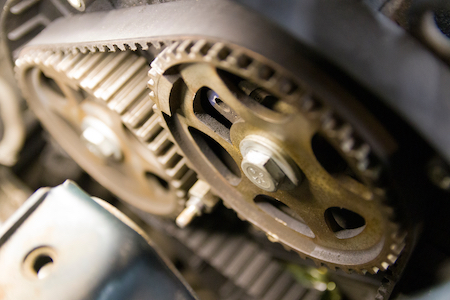Driving your car is something most of us take for granted. When we head out of the house in the morning, we have meetings and appointments on our minds, not car maintenance.
Your car may create alternative plans. If the heater isn’t producing hot air, or your brakes are squeaking as you apply pressure, you might be able to drive for a bit, enough to allow you to make an appointment and bring your car in. But a serpentine belt is a vital component of your vehicle. If it breaks, it can leave you stuck away from home.
What is a serpentine belt?
The serpentine belt is a rubber belt that circulates and brings power to various components of your vehicle. You might also hear it referred to as a fan belt or an accessory belt. That’s because the serpentine belt is designed to bring power to the engine accessories – the alternator, power steering pump, air conditioning compressor, and in some cases, the water pump.
While using one long belt is both an efficient and reliable way of powering the various components underneath the hood, relying on your car’s serpentine belt for a variety of tasks can also put you at greater risk. If the serpentine belt breaks, everything stops working.
If your water pump no longer works, the air conditioning quits blowing, it impacts what’s happening underneath the hood. The battery eventually dies, and the engine will overheat. It can damage all of the major components controlled by the parts connected to the belt.
If it breaks, your risk quickly grows. But if you have it checked periodically and have it replaced before it has a chance to break, you’ll thwart potential problems before they occur.
What happens when the serpentine belt breaks?
The serpentine belt doesn’t just break without warning. Instead, it slowly wears out over time. It can be contaminated or damaged through normal wear and tear. This can slow down the movement, which means the belt is no longer spinning at proper speed. That decreases power to the electrical system, which can impact a variety of accessories, from a loss in power steering, to a decrease in cooled air flowing through the system.
A broken serpentine can stop the water pump, which circulates coolant through the cooling system, which in turn keeps the engine from overheating. While this may not cause an immediate problem, the more you drive it, the more damage done internally to your engine compartment.
A broken belt also may prevent power from moving the alternator, decreasing the power to the vehicle’s eclectic system. If the battery can’t recharge, the headlights will dim, the radio won’t work, until eventually, the battery dies too.
Luckily, a serpentine belt doesn’t give out without a few warning signs. Like other parts on your vehicle, if you notice it’s not working well, bringing it in for an inspection is your best way of preventing larger problems down the road.
Watch for:
Lack of cooled air from the air conditioner – lack of cooled air can be attributed to various problems. Since the serpentine belt controls the functions of the air conditioner, a lack of cool air may be a sign it’s broken.
Squealing sounds – as the rubber belt slips and loosens from the various components, it can make a distinct squealing sound. This can also happen if it misaligns, requiring a simple adjustment to get it back on track.
Whining sounds – the serpentine belt moves and angles in many different directions as it wraps around the various components. As the belt wears, the tension can change, which changes the speed of the belt. That can cause it to rub up against components it’s not meant to connect with, creating a whining sound. If you ignore the sound, it can continue to wear down the various parts, causing you more repair bills in the long run.
No power steering – if you suddenly have trouble steering, with turns and adjustments needing considerable arm strength, it could be a sign of a bad serpentine belt. This could also be a sign of low power steering fluid, so it’s important to bring your car in quickly to ensure it’s in proper working condition.
Overheating engine – if the serpentine belt is broken, it won’t activate the water pump, which helps keep the engine cool. The longer you drive without proper cooling function, the greater damage your engine will experience.
Visible cracks in the serpentine belt – the serpentine belt is easy to see if you pop the hood and glance into the engine compartment. If you notice visible cracks anywhere on the belt, it’s time to schedule an appointment to have it replaced.
Dead battery – a dead battery can be caused by many issues, including a serpentine belt that is no longer driving power. If your battery suddenly dies, ensure the serpentine belt is still attached. Without the alternator’s charge, the battery eventually stops working, which will impact the various accessories throughout your vehicle.
How much will it cost to replace a serpentine belt?
Cost is almost always one of the first questions a car owner asks. When budgets are tight, it’s easy to push maintenance visits as far apart as possible, hoping to push repair bills to the next paycheck.
The serpentine belt is one of the less expensive replacements you can make. If it just needs readjustment, you’ll pay for labor costs. The belt itself won’t break the bank.
Compare that to allowing your car to operate with a broken serpentine belt, where damage starts occurring with various components underneath the hood. If the water pump isn’t working, and allows the engine to overheat, your repair bills will rise exponentially.
To keep your vehicle in good repair, schedule maintenance visits periodically for a mechanic to inspect underneath the hood, and make suggestions for keeping it performing well.
Is your serpentine belt working well?

